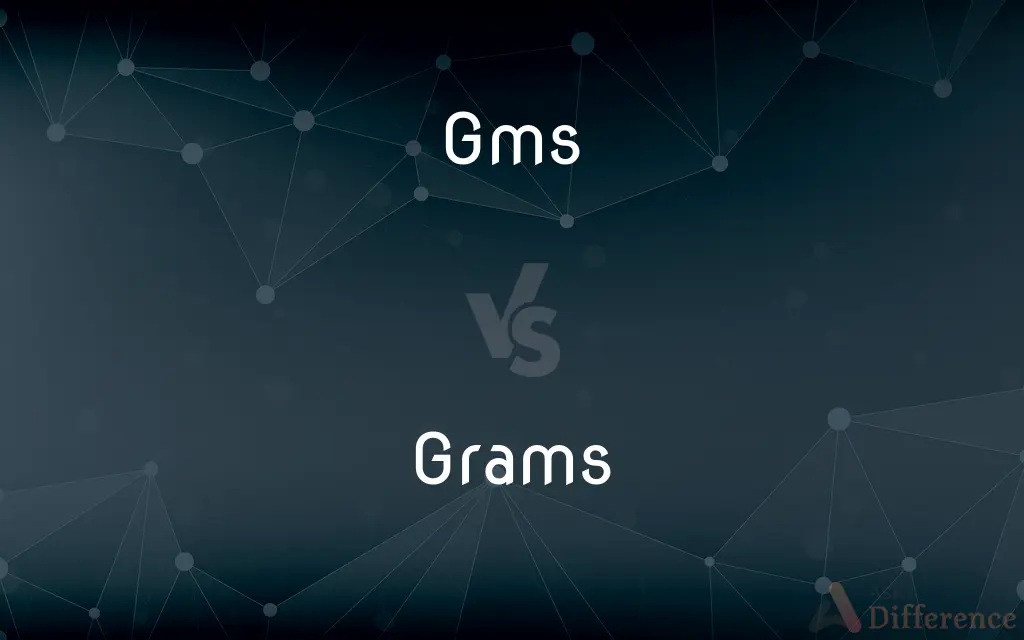Gms vs. Grams — What's the Difference?
By Tayyaba Rehman & Urooj Arif — Updated on March 27, 2024
Gms is an informal abbreviation for grams, while grams are a metric unit of mass, both referring to the same measurement.

Difference Between Gms and Grams
Table of Contents
ADVERTISEMENT
Key Differences
Gms is often used colloquially or in informal writing as a shorthand abbreviation for grams, the standard unit of mass in the metric system. Whereas grams, denoted as "g," are the official and internationally recognized unit for measuring mass, used in scientific, educational, and professional contexts.
The use of "gms" might be more prevalent in quick, informal communications such as text messages, notes, or non-scientific documents. On the other hand, "grams" is universally used in academic papers, textbooks, legal documents, and any formal setting where precise and standardized communication is required.
There is no difference in the quantity that "gms" and "grams" represent; both refer to the same unit of mass. The distinction lies in the level of formality and the context in which they are used, with "grams" being the appropriate term in formal and scientific contexts.
Despite the informal status of "gms," it is understood in casual communication. However, for clarity and professionalism, "grams" is preferred, especially in written and published materials. This adherence ensures consistency and avoids confusion in international and professional communications.
Comparison Chart
Formality
Informal abbreviation
Official unit of mass
ADVERTISEMENT
Usage Context
Casual, quick texts
Scientific, educational, professional
Standardization
Not standardized
Internationally recognized
Precision
Understood but less used
Precisely defined
Communication
Non-professional
Professional, academic
Compare with Definitions
Gms
Utilized in academic and research settings for precision.
The chemical reaction was catalyzed by adding 2 grams of the catalyst.
Grams
Used casually, primarily in non-professional contexts.
Ensure you have 250gms of butter at room temperature.
Gms
Used in scientific contexts to ensure accuracy and clarity.
The experiment required an exact mass of 5 grams of the substance.
Grams
Might be seen in informal recipes or personal notes.
I lost 500gms this week.
Gms
The standard unit for nutritional information on food labels.
The yogurt contains 15 grams of protein per serving.
Grams
Can appear in digital communication, like texts or social media.
Bought 1000gms of chicken for the BBQ.
Gms
A metric unit of mass equal to one thousandth of a kilogram.
She measured 100 grams of flour for the recipe.
Grams
An informal shorthand for grams, often used in quick or casual writing.
Add 200gms of sugar to the mixture.
Gms
Essential in international trade and commerce for weight measurement.
The shipment weighed 5000 grams.
Grams
While understood, it's less preferred in formal documentation.
The document incorrectly listed the weight as gms instead of grams.
Gms
Plural of gm; grams.
Add 5 gms of salt and 10 gms of sugar.
Grams
A grandmother.
Grams
Plural of gram
Grams
Grandmother
Common Curiosities
Can I use "gms" in scientific research papers?
It's best to use "grams" in scientific and formal writings to maintain precision and adherence to standards.
What does "gms" stand for?
"Gms" stands for grams, serving as an informal abbreviation.
Is it incorrect to use "gms"?
While not incorrect in casual use, "grams" is preferred for accuracy and formality in most written and professional contexts.
Is there a difference between "gms" and "grams"?
There is no difference in measurement; the distinction lies in formality and context, with "grams" being the correct, formal term.
What happens if I use "gms" in a professional document?
Using "gms" in a professional document might be seen as informal or less precise, potentially leading to requests for revision to standard terminology.
Is the usage of "gms" common in all countries?
The use of "gms" as an abbreviation can vary, but "grams" is universally recognized and understood.
Why is "grams" preferred over "gms" in professional settings?
"Grams" is internationally recognized and standardized, ensuring clarity and professionalism in communication.
Can "gms" and "grams" be used interchangeably?
In informal contexts, yes, but in formal and scientific communications, "grams" is the appropriate choice.
Are there any contexts where "gms" is preferred?
"Gms" might be preferred in quick, informal texts or personal notes, but "grams" is suitable for all formal and precise contexts.
Why is standardization important in units of measurement like grams?
Standardization ensures that measurements are accurate, consistent, and universally understood, important for science, trade, and daily life.
How are grams used in everyday life?
Grams are used to measure weight in cooking, nutritional information, science experiments, and more.
What is the symbol for grams?
The symbol for grams is "g," not "gms," which is an informal abbreviation.
How do I convert grams to kilograms?
To convert grams to kilograms, divide the number of grams by 1000.
Can using "gms" lead to misunderstandings in measurements?
While "gms" is generally understood, using the formal "grams" eliminates any potential for misunderstanding.
How should I refer to grams in academic writing?
In academic writing, always use "grams" and the symbol "g" for clarity, precision, and adherence to scientific standards.
Share Your Discovery

Previous Comparison
Doe vs. Hind
Next Comparison
Furthest vs. FarthestAuthor Spotlight
Written by
Tayyaba RehmanTayyaba Rehman is a distinguished writer, currently serving as a primary contributor to askdifference.com. As a researcher in semantics and etymology, Tayyaba's passion for the complexity of languages and their distinctions has found a perfect home on the platform. Tayyaba delves into the intricacies of language, distinguishing between commonly confused words and phrases, thereby providing clarity for readers worldwide.
Co-written by
Urooj ArifUrooj is a skilled content writer at Ask Difference, known for her exceptional ability to simplify complex topics into engaging and informative content. With a passion for research and a flair for clear, concise writing, she consistently delivers articles that resonate with our diverse audience.














































